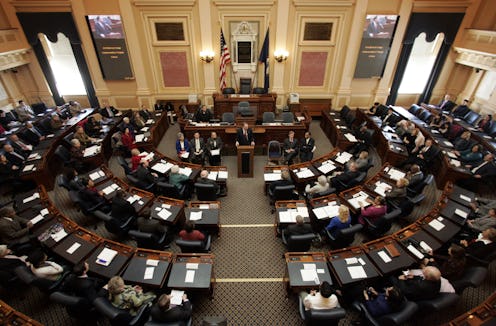News
Why 270 Electoral Votes Is The Magic Number

The presidential election is on its way, after more than a year campaigning and nearly two years of speculation and media coverage. On Nov. 8, all of America will head to the polls (or, the 55 to 60 percent or so of Americans who participate) to make their pick for president, whether it's Republican nominee Donald Trump, Democratic nominee Hillary Clinton, or alternative candidates like Gary Johnson, Jill Stein, or Evan McMullin. But it's not a directly democratic election ― so, why is 270 electoral votes the magic number for a candidate to seize the presidency?
Luckily, some questions in life are easily answered. At the end of election night, assuming every state's race can be called without need for recounts, a full 538 electoral votes will have been distributed between the two (or maybe three, depending on how McMullin does in Utah) candidates. Half of 538 is 269, and in order to secure the White House, one candidate needs to claim an outright majority.
Simply put, 270 is the fewest amount of electoral votes that still constitutes a majority, and therefore, it's the magic number that everyone's eyes will be on when the votes are being tallied.
Needless to say, the electoral college system has caused some controversy in recent years, thanks in large part to the fact that the winner of the popular vote doesn't necessarily always finish with the most electoral votes ― the 2000 election between Al Gore and George W. Bush is a recent, particularly infamous example. If not for the Electoral College, the Bush presidency never would've happened, a fact that soured many Democrats on it at the time.
It's also true that the necessity for a majority rather than simply a plurality opens up the potential for an extremely controversial, contentious outcome if nobody crosses the 270 mark. If neither candidate can get past 270, then it falls to the House of Representatives to vote to select the next president (which would almost assuredly mean a Trump win), while the Senate would select the vice president. Make no mistake, this outcome would be inflammatory enough that it could cause serious national unrest.
In other words, if you're the kind of person who prizes stability and credibility in government ― as much as the United States can ever have that ― you should be rooting hard for somebody, anybody to get that outright majority. Although especially if you're a Clinton supporter, because that's her only viable path to the White House.
Image: AP/REX/Shutterstock (1)